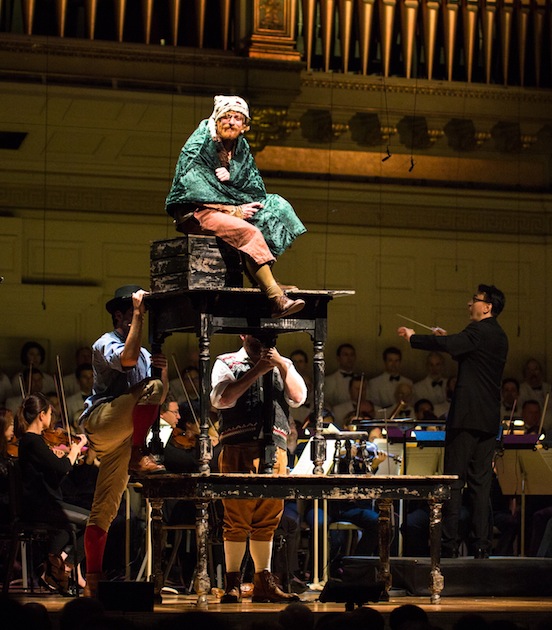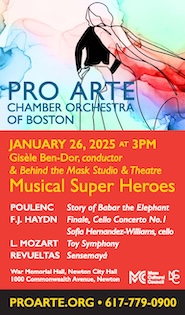In the Symphony Hall of the Mountain King: Masur leads BSO in Grieg’s complete music for “Peer Gynt”

Ken-David Masur conducted the BSO in Grieg’s “Peer Gynt” Thursday night with actor Caleb Mayo. Photo: Robert Torres
The Boston Symphony Orchestra delved into the world of theater Thursday night at Symphony Hall. Ken-David Masur led the orchestra, Tanglewood Festival Chorus, and guest soloist in Grieg’s complete incidental music to Peer Gynt performed in tandem with excerpts from the play that inspired it.
Henrik Ibsen’s story of the roving Norwegian youth was intended to be read and not presented dramatically, but after the writer met Grieg he hatched a plan to stage the work. The finished production was of Wagnerian length, spanning five acts in as many hours. Grieg’s score, which remains popular as orchestral suites, lasted about ninety minutes in its original version.
Bill Barclay, a writer who adapted Mendelssohn’s A Midsummer Night’s Dream for a similarly live theatrical performance with the BSO last season, shortened Ibsen’s version to about an hour and a half while keeping to the original’s spoken rhythm and rhyme scheme. Updated jokes about the benefits of public domain and the EU were added to make the story more accessible to modern ears.
But the play’s moral theme resonated clearly. Peer Gynt is a self-assured party animal who shirks responsibility in favor of pleasure. He roams about town drinking and seducing women, abruptly running away when conflicts or attachments arise. He eventually travels the world driven by his free will and his desire to remain true to himself. A person is good only if he does no evil is his motto. But he realizes his error at the end of his life: the self, he learns rather late, is best served when placed in the service of others.
The acting Thursday night was excellent and carried out by local performers who have established credits for theatre, film, and television. Caleb Mayo was a bold and cocky presence as Peer, ever joyous and slow to change his mind. Bobbie Steinbach was Peer’s mother Ase, who in her death scene found the aching sadness of an old women pining for her son. Georgia Lyman found the flirtatious side of the Woman in Green, one of Peer’s sexual conquests, and Risher Reddick was the laugh-inducing Mountain King. Soprano Camilla Tilling sang with warm tone and vibrant folk inflection as Solveig.
Barclay’s stage direction made full use of the space, and simple props of chairs, tables, and coat racks left the Norwegian countryside and other exotic locations up to the imagination. Kathleen Doyle’s costumes—folk dress for both women and men—bathed the scenes in bright colors.
Grieg’s music filled out the drama, and Ken-David Masur led an incisive rendition of the score. Conducting with gentle waving gestures, he coaxed supple phrasing from strings and winds in “Ase’s Death.” “Anitra’s Dance,” which accompanied to Mayo’s and Caroline Kinsolving’s dance scene, had sultry fire, and the popular “Hall of the Mountain King” moved from passages of impish glee to rousing heights. The Tanglewood Festival Chorus, prepared by James Burton, suffered from a few tentative attacks in the soft vocal numbers, but sang with fire and commitment when called upon in the heavier sections of the score.
To open the concert, Masur led a similarly detailed reading of Beethoven’s incidental music to Egmont.
Beethoven’s score is remembered today primarily for its overture. But the complete version contains lyrical and richly expressive music for soprano soloist and orchestra.
Masur drew out the phrases of the overture for dramatic effect. Melodies were spun in long lines, and pauses between cadences were grand. Wind phrases, too, were carefully sculpted, and subtle rubato shadings tilted the music towards darkness. In quick movements, the conductor mined the agitation and energy from the music, and in slow sections he drew attention to elements buried beneath the score’s surface, such as flowing cello lines and haunting wind phrases.
In the two “Klärchen Songs” Camilla Tilling sang with clear diction and brightly projected voice, deftly handling the trickling lines with nimble grace. Will Lyman was underutilized as a narrator, but when called upon he delivered a sensitive reading of “Sweet sleep” before the music swelled to a grand conclusion.
The program will be repeated complete 8 p.m. Saturday and Tuesday at Symphony Hall. The Grieg only will be performed 8 p.m. Friday. bso.org; 888-266-1200
Posted in Performances


